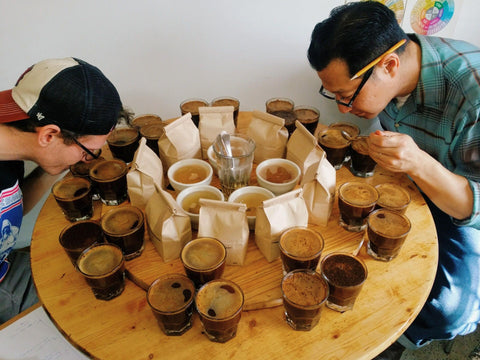Reasons why the demand for specialty coffee is growing this year
Baristas and cafe-goers alike rejoiced as our beloved coffee shops began making a comeback once pandemic restrictions eased this year. Even though more people are venturing out to buy their favorite espresso drinks, overall coffee demand is currently decreasing due to a multitude of global economic, political, and environmental concerns.
Despite the expected rise in global coffee consumption, the United States is forecasted to import less coffee this year.
Coffee is still the leading beverage consumed in America; more Americans drink coffee than any other beverage (65% of them!). The pandemic didn’t change how much coffee Americans drink, but where they drink it. In 2023, 83% of coffee drinkers consumed coffee at home, up 4% since 2020. However, only 35% of American coffee drinkers had coffee away from home; this percentage is up from a low of 31% in January 2021 but down from 41% in January 2020.
Despite the decreased demand in the US for coffee as a whole, the specialty coffee market is thriving in relation to conventional coffee. In 2022, specialty coffee consumption hit a five-year high; 43% of coffee drinkers chose specialty coffee, up 20% since January 2021. This rising popularity is due to the inherent principles of specialty coffee – its high quality and social and environmental focus.

Specialty coffee refers to the highest quality coffee available, usually with a focus on the entire supply chain and single-origin beans. In general, specialty coffee tastes better than conventional coffee because it must receive at least 80 points on the 100-point scale used as a quality standard in the coffee industry. Specialty coffee encapsulates consumers’ increasing preference for sustainability, and it has been the front-runner in the transition toward a more sustainable coffee industry. Specialty coffee industry stakeholders have set the stage for collective action and building value networks with coffee producers at the center, which, in theory, guarantees a more equal distribution of wealth and power in the industry. The specialty market also aims to improve the degree of transparency within the supply chain so that bean quality, environmental impacts, and revenue flow among stakeholders can be evaluated and improved.
According to Grand View Research, the global specialty coffee market size is expected to grow at a compound annual growth rate of 11.3% from 2023 to 2030. The demand for specialty coffee has grown significantly in recent years due to changing consumer preferences and a focus on sustainability. During the pandemic, the shift to remote work and the closure of cafes led to an increase in at-home coffee consumption, driving up sales of at-home coffee products and brewing equipment and Ready To Drink coffee products. Sourcing our own beans forced consumers to think more deeply about where how our coffee is produced. For the age group of 18-24 – who dominated the population of specialty coffee consumers – the popularity of specialty coffee is attributed to their growing interest in food and beverage, the value of authenticity and unique experiences, the focus on health and sustainability, and the impact of social media and digital technology. With more information available in the digital world about coffee quality and its environmental and social impacts, more consumers are choosing to spend their money on coffee that aligns with their personal ethos.
Written by
Melina Devoney
Barista, Coffee Captain, Blogger
Melina Devoney
Barista, Coffee Captain, Blogger